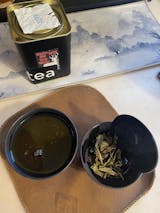Gatekeeper | 2024 Spring Gongmei
No reviews
One River Tea
Regular price
$28.00
Sale
Tea: Gatekeeper
Type: Gongmei Heirloom White Tea
Harvest: Spring 2024
Press Date: Spring 2024
Region: Panxi, Fuding, China
Producer: Master Qiu
Tasting Notes: Pine Sap, Fresh Sage, Cream, Vanilla Wafers, Sweet Pea
This wrapper was designed by a 12 year old tea lover by the name of James. After listening to the Tea Soup podcast episode about designing tea cake wrappers, he was inspired to make a design and send it to us. We were enchanted by the bamboo backdrop and the simple tea scene depicted; moreover, we were moved by the realization that tea is for everyone for the elderly, for the youth, for the emperors, for the common person, even for pandas. We decided calling this tea cake "Gatekeeper" to remind us that tea needs no gatekeeping, keep that tea table open to all who would enjoy this most welcoming beverage.
For all those who like James have listened to the white tea episodes of Tea Soup, you'll know just why we are so excited to press this gongmei tea cake. Gongmei used to refer to a specific picking grade of white tea, but in 2018 this all changed, and now gongmei refers exclusively to the local heirloom tea cultivar of Fuding: known alternatively as Tucha, Caicha, or Bendi Cha.
After this regulation came about, a lot of farmers began tearing out their old heirloom bushes to plant row upon row of the more reliable Da Baohao cultivar. While their number is fewer, the true heirloom tea gardens have not all gone the way of the Dodo, but continue to produce their ancient offerings.
Thus, this tea cake is made exclusively from the ancestral tea cultivar of Fuding: Gongmei. When compared to the Da Baihao, Gongmei is much more vegetal, earthier, greener and spicier than its sweet and floral offspring. We are excited to see how this tea will age, as it is an exceedingly uncommon practice to press exclusively gongmei tea cakes.
When the dry leaves are placed in the warmed brewing vessel, we are met with a strong aroma of pinesap mixed with cooking spices. There is something both vegetal and savory about the fragrances of the wet leaves, but the brew is exceptionally light, clear, clean, and refreshing on the tongue. We get notes of cream, that is sweetened by the slightest hint of vanilla wafers. A majority of this session stays vegetal and complex without betraying hints of flowers that we find in the Da Baihao cultivar. We are excited to see the thick mineral depths this tea acquires as it ages. Already this tea sits pleasantly in the stomach and has a modest, relaxed energy about it.
Never bought a tea cake before? Check out our video on how to break it apart!














